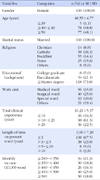Abstract
Purpose
The aim in this study was to identify head nurses' nursing performance according to their managerial competencies and professional nurse autonomy.
Methods
From January 15 to January 31, 2013 a survey was distributed to 200 head nurses working in 5 tertiary hospitals in B city and J city. The response rate was 80% (160 responses). The survey content included the Managerial Competencies Scale (MCS), Schutzenhofer professional nurse autonomy Scale (SPNA), and Nursing Performance Scale (SPNA).
Figures and Tables
References
1. Manenti SA, Ciampone MHT, Mira VL, Minami LF, Soares JMS. The construction process of managerial profile competencies for nurse coordinators in the hospital field. Rev Esc Enferm USP. 2012; 46:727–733.
2. Tang JH. Evidence-based protocol: Nurse retention. J Gerontol Nurs. 2003; 29(3):5–14.
3. Lee SH, Yoo JS. Influencing factors on task performance of wound ostomy continence nurses in Korea. J Korean Acad Soc Nurs Educ. 2012; 18:533–541. http://dx.doi.org/10.5977/jkasne.2012.18.3.533.
4. Top M. Organizational variables on nurses' job performance in Turkey: Nursing assessments. Iran J Public Health. 2013; 42:261–271.
5. Sorrentino EA, Nalli B, Schriesheim C. The effect of head nurse behaviors on nurse job satisfaction and performance. Hosp Health Serv Adm. 1992; 37(1):103–113.
6. Kim IS. Analysis of the work of the head nurse and a work model for the head nurse in university hospitals in Korea [dissertation]. Seoul: Yonsei University;1988.
7. Lorber M, Skela Savič B. Perceptions of managerial competencies, style, and characteristics among professionals in nursing. Croat Med J. 2011; 52:198–204. http://dx.doi.org/10.3325/cmj.2011.52.198.
8. Tornabeni J. The competency game: my take on what it really takes to lead. Nurs Adm Q. 2001; 25(4):1–13.
9. Lee SM. An analysis of nursing managerial competencies [master's thesis]. Seoul: Yonsei University;1996.
10. Baek HJ. Comparison of nurses' perception on nursing managerial competency [master's thesis]. Daejon: Chungnam National University;2004.
11. Byeon HS. A study on the nursing managerial competency of head nurses in the general hospitals [master's thesis]. Gwangju: Chonnam National University;2000.
12. Bae KO. The influence of transformational leadership of nursing unit manager on job satisfaction and job performance of staff nurses [master's thesis]. Seoul: Ewha Womans University;2007.
13. Chi SA, Yoo HS. Concept analysis of professional nurse autonomy. J Korean Acad Fundam Nurs. 2001; 31:781–792.
14. Kim NJ. Study of professional autonomy on employed on complex organization. Korean Civic Ethics Rev. 1998; 11:23–40.
15. Sung MH, Eum OB. Professional autonomy and clinical decision making ability in clinical nurse. J Korean Acad Fundam Nurs. 2010; 17:274–281.
16. Go JS. Gaps among necessity, possession and exercise of nursing management skills and its causes of head nurses at general hospitals [master's thesis]. Kimhae: Inje University;2004.
17. Schutzenhofer KK. The measurement of professional autonomy. J Prof Nurs. 1987; 3:278–283. http://dx.doi.org/10.1016/s8755-7223(87)80039-x.
18. Strickland OL, Waltz CF.
KJ Han
EO Lee
SA Park
YS Ha
GS Kim
. Measurement of nursing outcomes, Volume two, measuring nursing performance: Practice, education, and research. The instruments of nursing research. Seoul: Hyunmoonsa;1994.
19. Yang CS. Relationship between professional nurse autonomy and nursing performance [master's thesis]. Seoul: Yonsei University;2004.
20. Kron T. The management of patient care. Philadelphia: Saunders Company;1981.
21. Park SA. An exploratory study on the relationship between leadership style and performance in Korean nursing units [dissertation]. Seoul: Seoul National University;1989.
22. Coughlin C. Saving nursing management. J Nurs Adm. 2002; 32:178–179.
23. Mathena KA. Nursing manager leadership skills. J Nurs Adm. 2002; 32:136–142.
24. Kang CM, Chiu HT, Hu YC, Chen HL, Lee PH, Chang WY. Comparisons of self-ratings on managerial competencies, research capability, time management, executive power, workload and work stress among nurse administrators. J Nurs Manag. 2012; 20:938–947. http://dx.doi.org/10.1111/j.1365-2834.2012.01383.x.
25. Edwards PA, Roemer L. Are nurse managers ready for the current challenges of healthcare? J Nurs Adm. 1996; 26(9):11–17.
26. Kim ES. Study on attitudes toward professional autonomy and job satisfaction of clinical nurses [master's thesis]. Seoul: Ewha Womans University;1994.
27. Fujino Y, Tanaka M, Yonemitsu Y, Kawamoto R. The relationship between characteristics of nursing performance and years of experience in nurses with high emotional intelligence. Int J Nurs Pract. 2014; http://dx.doi.org/10.1111/ijn.12311.
28. Oh EH, Chung BY. The effect of empowerment on nursing performance, job satisfaction, organizational commitment, and turnover intention in hospital nurses. J Korean Acad Nurs Adm. 2011; 17:391–401. http://dx.doi.org/10.11111/jkana.2011.17.4.391.
29. Kim SI. Nursing management, strategies for its success. Korean Nurse. 1990; 29(5):46–53.




 PDF
PDF ePub
ePub Citation
Citation Print
Print







 XML Download
XML Download